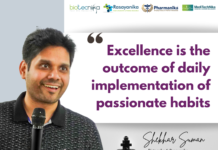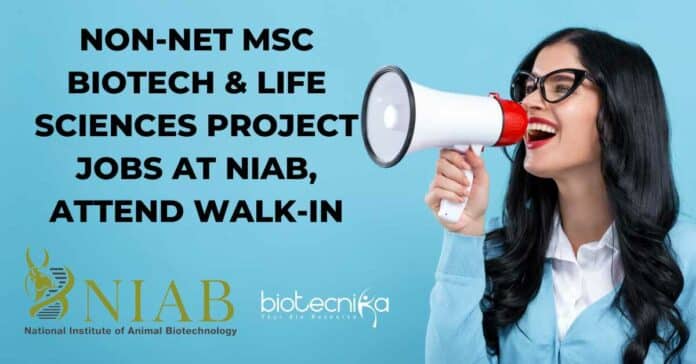NIAB MSc Project Vacancy For Life Sciences, Biotechnology – Attend Walk-In
NIAB MSc Project Vacancy For Life Sciences, Biotechnology – Attend Walk-In. National Institute of Animal Biotechnology vacancies. MSc Life Sciences and Biotechnology project jobs. Interested and eligible applicants can check out all of the details on the same below
Don’t forget to check out possible interview questions for this job below
This job expires in
National Institute of Animal Biotechnology, Hyderabad–500032
(An Autonomous Institute of the Department of Biotechnology)
Advt. No. 20/2023 – Walk-in Interview
Applications are invited from suitable candidates for filling up the following position at the National Institute of Animal Biotechnology (NIAB), Hyderabad. (PI: Dr. Pankaj Suman) through walk-in interview.
Name of the Post: Project Associate-I
No. of Posts: 2 Positions
Name of the Project: Socio-economic upliftment of landless and marginal farmers of Yadgir district (an aspirational district) of Karnataka through goat rearing
Name of the PI: Dr. Pankaj Suman
Duration: Maximum 6 months
Age: 35 years (Relaxation is admissible in case of SC/ST/OBC candidates as per Government instructions)
How to Apply –
Interested candidates for the walk-in interview can send their biodata to Dr. Pankaj Suman (Email: [email protected]). An online link will be shared with the eligible candidates for the interview scheduled on 19-06-2023 from 9:30 am to 1:30 PM at the National Institute of Animal Biotechnology. Candidates must share scanned copies of documents in support of their date of birth, educational qualifications, resume and experience.
Fellowship amount: Rs 31,000 + 24 % HRA as per the DST guidelines.
Eligibility:
a. MSc (Life Sciences/Biotechnology / Veterinary Sciences (MVSc)
b. Non-NET-qualified candidates with postgraduate degrees in the above-mentioned
disciplines can also apply; they will be paid as per DST guidelines.
c. Candidates with experience to handle a socio-economic aspect of rural development,
molecular biology, animal breeding, and livestock management will be given preference.
Check the notification below
💡 Here are a few possible interview questions for the above job posting and their answers.
👍We hope this helps in giving you a rough idea as to how to prepare for the interview for this specific role. Good luck!
- Question: Can you describe your experience in handling a socio-economic aspect of rural development? How can this experience be applied to the project focused on the socio-economic upliftment of landless and marginal farmers through goat rearing? Answer: During my previous work in rural development projects, I have gained experience in conducting socio-economic assessments, implementing livelihood programs, and facilitating community engagement. This experience can be valuable for the project at hand as it involves improving the socio-economic conditions of landless and marginal farmers through goat rearing. I can leverage my knowledge to design and implement interventions, provide technical guidance, and assess the impact of these initiatives on the farmers’ well-being.
- Question: Have you worked with molecular biology techniques related to animal breeding and livestock management? If so, can you provide examples of techniques you have employed in your previous research or projects? Answer: Yes, I have experience with molecular biology techniques related to animal breeding and livestock management. For instance, I have used genotyping methods such as PCR and DNA sequencing to analyze genetic markers associated with desirable traits in livestock. I have also conducted gene expression studies using techniques like RT-PCR to understand the molecular mechanisms underlying specific traits. These techniques allow for informed breeding decisions and the improvement of livestock productivity and health.
- Question: How would you approach the challenge of implementing a goat rearing program in an aspirational district like Yadgir? What factors would you consider in designing and implementing the program to ensure its success? Answer: Implementing a goat rearing program in an aspirational district requires a comprehensive approach. I would first assess the socio-economic conditions, available resources, and existing livestock management practices in Yadgir. Based on this assessment, I would develop a tailored program that addresses the specific needs and challenges of the local farmers. Important factors to consider include access to veterinary services, breed selection, feeding and nutrition strategies, training and capacity building, marketing linkages, and community participation. Regular monitoring and evaluation would be crucial to ensure the program’s success and make necessary adaptations as required.
- Question: Can you discuss any prior experience you have had in working with marginalized farming communities? How did you effectively engage with these communities and address their unique challenges? Answer: In my previous roles, I have actively worked with marginalized farming communities, particularly in rural development projects. To effectively engage with these communities, I have adopted participatory approaches, involving them in the project design and decision-making processes. I have conducted awareness programs, training sessions, and workshops to enhance their knowledge and skills. Understanding their unique challenges, such as limited resources or traditional practices, I have collaborated with community leaders, local organizations, and government agencies to implement sustainable interventions that empower the communities and address their specific needs.
- Question: The project duration is set for a maximum of six months. How would you plan and execute your work within this limited timeframe to achieve the desired objectives? Answer: Working within a limited timeframe requires efficient planning and execution. I would begin by conducting a detailed project assessment to identify key milestones, deliverables, and timelines. Based on this, I would develop a comprehensive work plan, allocating resources and setting realistic targets. Effective time management, prioritization, and coordination with team members would be crucial to ensure smooth execution. Regular monitoring and periodic evaluations would allow for timely adjustments and ensure that the project progresses as planned, ultimately achieving the desired objectives within the given timeframe.
Please note that these are sample answers, and it’s important to tailor your responses to your own experiences and knowledge. Good luck with your interview!
Editor’s Note: NIAB MSc Project Vacancy For Life Sciences, Biotechnology – Attend Walk-In. Please ensure that you are subscribed to the Biotecnika Times Newsletter and our YouTube channel to be notified of all of the latest in the industry. Follow us on all of our social media like Twitter, Telegram, Facebook and Instagram.


























